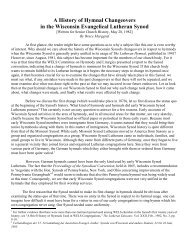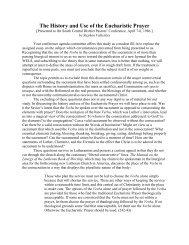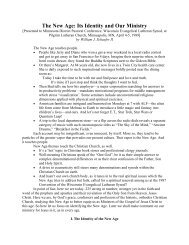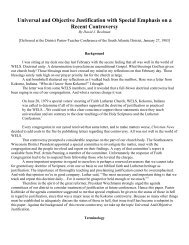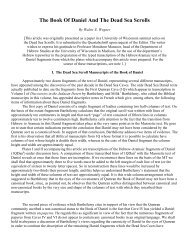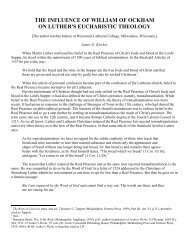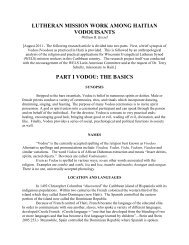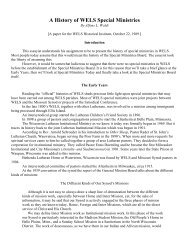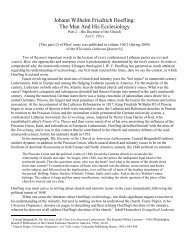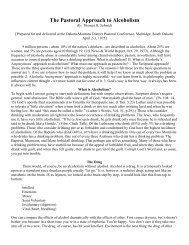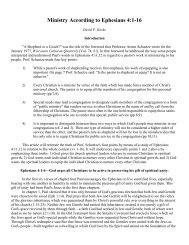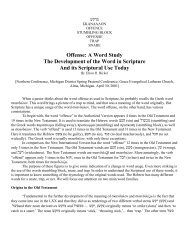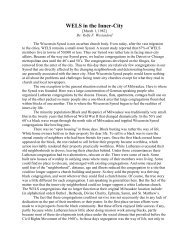Strangers to Sisters - Wisconsin Lutheran Seminary Library: Essays
Strangers to Sisters - Wisconsin Lutheran Seminary Library: Essays
Strangers to Sisters - Wisconsin Lutheran Seminary Library: Essays
You also want an ePaper? Increase the reach of your titles
YUMPU automatically turns print PDFs into web optimized ePapers that Google loves.
ule or judge in matters of faith, neither “the Church”, nor<br />
any individual teacher in the church, nor any pas<strong>to</strong>ral<br />
conference, nor any congregation, nor any synod, nor any<br />
majority, but only “that which is written.” 52<br />
While Koren does not directly address “father’s theology” in En Redegjoeresle,<br />
he demonstrates ably the pitfalls of it. If someone (like Schmidt, for example) uses the<br />
doctrinal writings of men without first studying the Scripture from which they are drawn<br />
and the <strong>Lutheran</strong> symbols which give testimony <strong>to</strong> the pure doctrine, then those writings<br />
can be easily misinterpreted and used <strong>to</strong> support a position the orthodox fathers never<br />
intended. This was clearly the case with F.A. Schmidt’s use of both Erik Pon<strong>to</strong>ppidan 53<br />
and Johann Gerhard 54 <strong>to</strong> support a doctrine which both these fathers would have objected<br />
<strong>to</strong> vehemently,<br />
…we acknowledge, not indeed as a complete definition of<br />
the concept of election, but still as a correct presentation of<br />
the last part of it, the answer given <strong>to</strong> Q.548 of<br />
Pon<strong>to</strong>ppidans’s Sanhed til Gudfrygtighed, which reads:<br />
“That God has appointed all those <strong>to</strong> eternal life whom he<br />
from eternity has seen would accept the grace proffered<br />
them, believe in Jesus and preserve in this faith un<strong>to</strong> the<br />
end. Rom. 8:28-30.” II Tim. 1:13.<br />
This is <strong>to</strong> be unders<strong>to</strong>od in the manner in which it is<br />
developed by John Gerhard in the following quotation:<br />
“The merit of Christ is the cause of our election. But since<br />
the merit of Christ does not benefit anyone without faith,<br />
therefore we say that the regard <strong>to</strong> faith (intuitu fidei) is a<br />
52 Koren, What the Norwegian Synod Has Always Wanted, 27.<br />
53 Erik Pon<strong>to</strong>ppidan (1698-1764), Norwegian <strong>Lutheran</strong> pas<strong>to</strong>r and professor who wrote a popular<br />
explanation of Luther’s Catechism for use in school and confirmation instruction entitled Sandhed til<br />
gudfrygtighed (“Truth un<strong>to</strong> Piety”). In his explanation of election, Pon<strong>to</strong>ppidan uses the phrase “in view of<br />
faith.” This long used phrase became improperly employed during the Election Controversy and was used<br />
falsely by Schmidt and other in the Norwegian Synod as a rallying point against the orthodox <strong>Lutheran</strong><br />
position.<br />
54 Johann Gerhard (1582-1637), German <strong>Lutheran</strong> theologian was the first <strong>to</strong> use the term intuitu fidei in<br />
connection <strong>to</strong> the doctrine of election. Gerhard employed the term in a way in which it could be properly<br />
unders<strong>to</strong>od, but later generations would take his meaning out of context and use it <strong>to</strong> support the heterodox<br />
position during the Election Controversy.<br />
33



